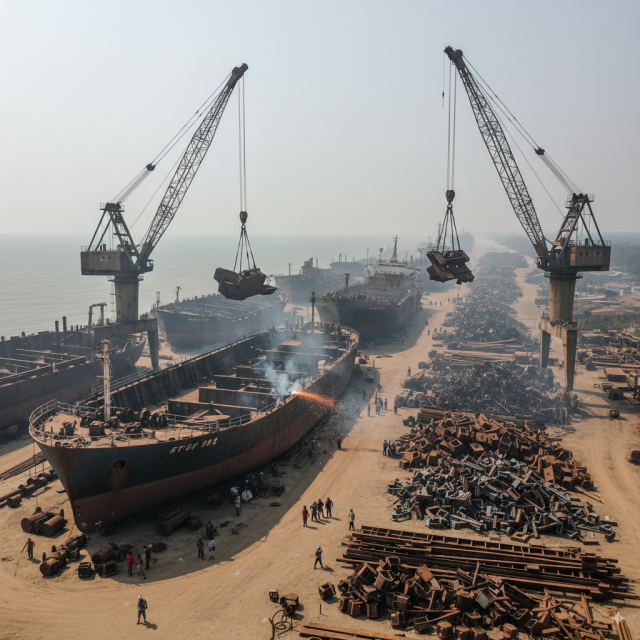From Our Correspondent, CHATTOGRAM:Chittagong’s coast is home to one of the world’s largest shipbreaking hubs. Shipbreaking began for the first time in Sitakunda, Chittagong, in the late 1960s. Over the past four decades, Chittagong has gradually become the “Shipbreaking Capital of the World,” handling more than half of the world’s decommissioned ships. However, the Hong Kong International Convention for the Safe and Environmentally Sound Recycling of Ships, which came into effect in September 2025, is set to bring major changes to the industry.
Economic Significance
Chittagong’s shipbreaking yards are a major source of raw materials not just for Bangladesh but for the entire South Asian steel industry. Around 70–80% of the country’s demand for steel rods and rebars is met through scrap metal from dismantled ships, producing nearly 2.5–3 million tons of iron annually. In addition, used generators, machinery, wood, furniture, and various other items are sold in local markets. This makes the shipbreaking industry a significant contributor to Bangladesh’s economy.
Hong Kong Convention Rules
The new convention mandates strict compliance to reduce environmental pollution, manage hazardous waste, and ensure workers’ safety during shipbreaking. Key requirements include:
Hazardous materials such as asbestos, PCBs, and mercury must be safely segregated and disposed of.
Workers must wear full protective gear including helmets, masks, and gloves.
Oil, chemicals, and gas tanks must be cleaned before ships are dismantled.
Instead of dragging ships directly onto the beach, yards must use concrete floors and waste management systems.
Chittagong’s Preparedness
According to the Bangladesh Ship Breakers and Recyclers Association (BSBRA), out of over 100 active yards in Chittagong, only 25–30 are in the process of upgrading to international standards. A few yards have already received European Union approval, allowing European shipping companies to send their decommissioned ships here.
However, small and medium yards face a major challenge. Upgrading to the new standards requires investments ranging from tens of millions to hundreds of millions of taka, which is not feasible for all.
Workers’ Reality
Nearly 200,000 workers are directly or indirectly employed in Chittagong’s shipbreaking sector. For years, they have faced risks from accidents, fires, explosions, and exposure to hazardous chemicals. International labor organizations (ILO) and human rights groups have long criticized these conditions.
The Hong Kong Convention brings hope for better worker safety and healthcare. Yet, some workers fear that if many small yards shut down, thousands could lose their jobs.
Environmental Impact
Shipbreaking in Sitakunda has long caused environmental concerns, including sea, soil, and water pollution, and damage to biodiversity. Heavy metals, oil, and chemicals often seep into the ocean, affecting the livelihoods of local fishermen. While the new convention could significantly reduce these issues, strict implementation remains a challenge.
Business Perspective
Yard owners acknowledge that although initial costs will rise to meet international standards, in the long term, Bangladesh will gain global credibility. Foreign shipping companies will feel more confident sending ships here, making the industry more sustainable. They are requesting government support in the form of easy loans, tax incentives, and infrastructure assistance.
Future Outlook
The Bangladesh government has passed a Ship Recycling Act and is establishing an international-standard ship recycling training center in Chittagong. The Department of Environment has also increased monitoring. Experts believe that with joint efforts from the government and entrepreneurs, Bangladesh could become not only South Asia’s but a global center for environmentally friendly ship recycling.
Success will depend on:
How well small yards adapt to new standards,
The extent of workers’ safety implementation,
The confidence of international ship owners.
If these challenges are addressed positively, the Hong Kong Convention could be an opportunity rather than an obstacle for Bangladesh.











